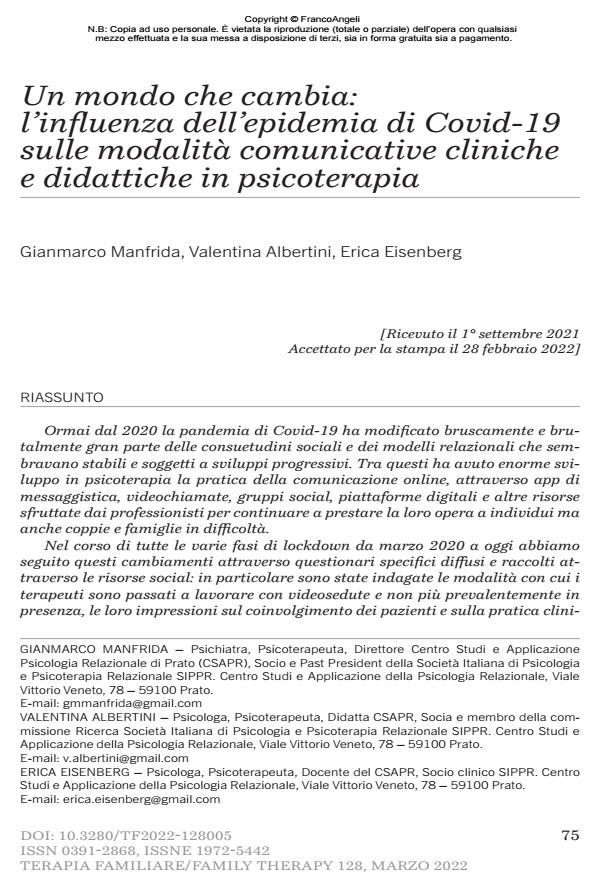A changing world: the influence of Covid 19 pandemic on communication in psychotherapeutic work and teaching
Journal title TERAPIA FAMILIARE
Author/s Gianmarco Manfrida, Valentina Albertini, Erica Eisenberg
Publishing Year 2022 Issue 2022/128
Language Italian Pages 19 P. 75-93 File size 1165 KB
DOI 10.3280/TF2022-128005
DOI is like a bar code for intellectual property: to have more infomation
click here
Below, you can see the article first page
If you want to buy this article in PDF format, you can do it, following the instructions to buy download credits

FrancoAngeli is member of Publishers International Linking Association, Inc (PILA), a not-for-profit association which run the CrossRef service enabling links to and from online scholarly content.
A couple of years has passed since Covid-19 pandemic has abruptly and brutally changed most social habits and relational models, which seemed stable and subject only to progressive changes. Among these, the practice of online communication has had a huge development, by means of instant messaging, video calls, social groups, digital platforms, app and other resources employed by professionals in order to provide assistance to individuals but also couples and families in need. During all phases of lockdown from march 2020 to today we have followed these changes by means of specific questionnaires disseminated and collected through social media: more specifically we have investigated the modalities adopted by therapists to start working with video calls and not anymore mainly in presence, their impressions of patients’ involvement and online oriented clinical practice, their satisfaction. Another investigation involved psychotherapy pupils of the first year of training, with the aim of checking their opinions and feelings regarding changes in didactics due to obligatory introduction of distance learning right at the beginning of their training. A third investigation concerned the appearance of various app in therapy session time and their use by therapists also. All these levels of investigation demonstrate that the traditional structure of therapy and didactic settings has been shocked by the acceleration the pandemic has imposed to use of online resources, starting a process of change which is not yet concluded but from which it emerges clearly the impossibility to go back to the prior state of affairs. Although these investigations cannot indicate the final results of a change still in progress, they follow and document along the way the path of an epochal revolution and can inspire us some predictions concerning clinical practice and psychotherapy teaching in a post-Covid world that is still to come.
Keywords: online Psychotherapy, remote therapy and teaching, development of online resources, therapeutic alliance, instant messaging and app, video sessions.
- Un lunghissimo virus. Effetti a distanza della Pandemia da Covid-19 Antonello D’Elia, in TERAPIA FAMILIARE 129/2022 pp.11
DOI: 10.3280/TF2022-129002 - Maximizing learning management systems in online college English education: Views from France and Saudi Arabia Abdulaziz I. Fageeh, in Social Sciences & Humanities Open 100868/2024 pp.100868
DOI: 10.1016/j.ssaho.2024.100868
Gianmarco Manfrida, Valentina Albertini, Erica Eisenberg, Un mondo che cambia: l’influenza dell’epidemia di Covid-19 sulle modalità comunicative cliniche e didattiche in psicoterapia in "TERAPIA FAMILIARE" 128/2022, pp 75-93, DOI: 10.3280/TF2022-128005